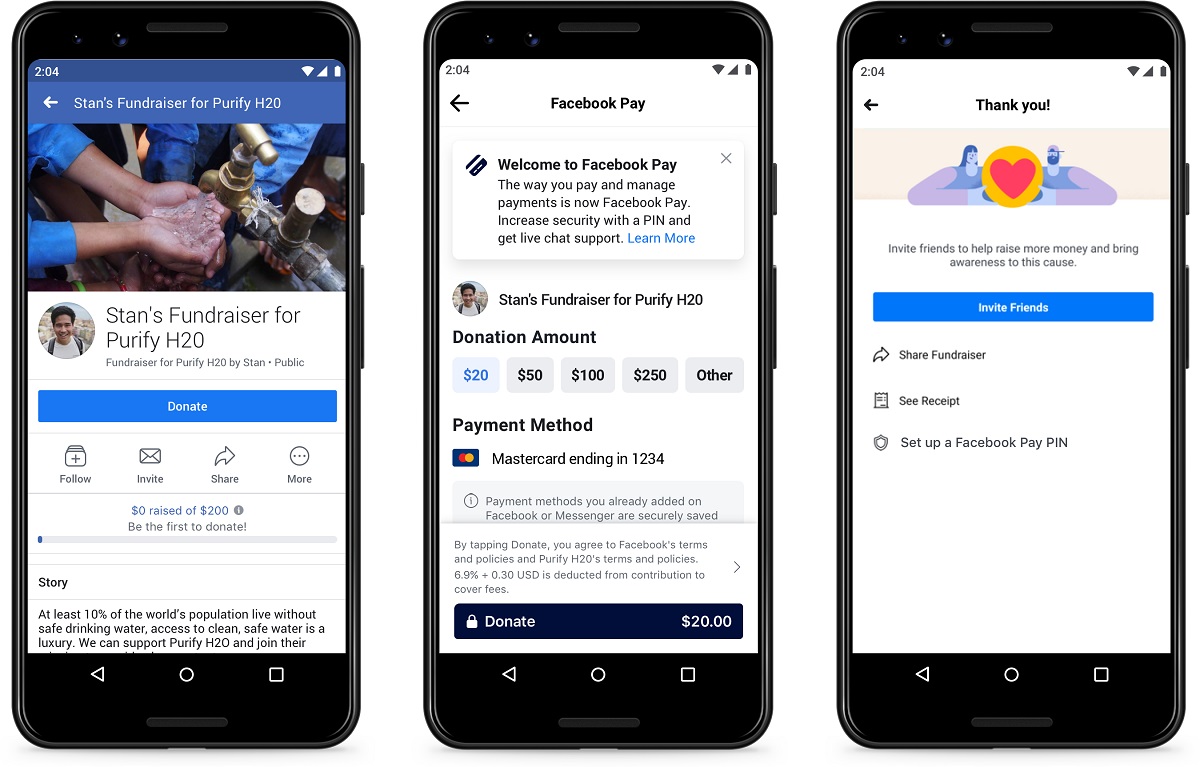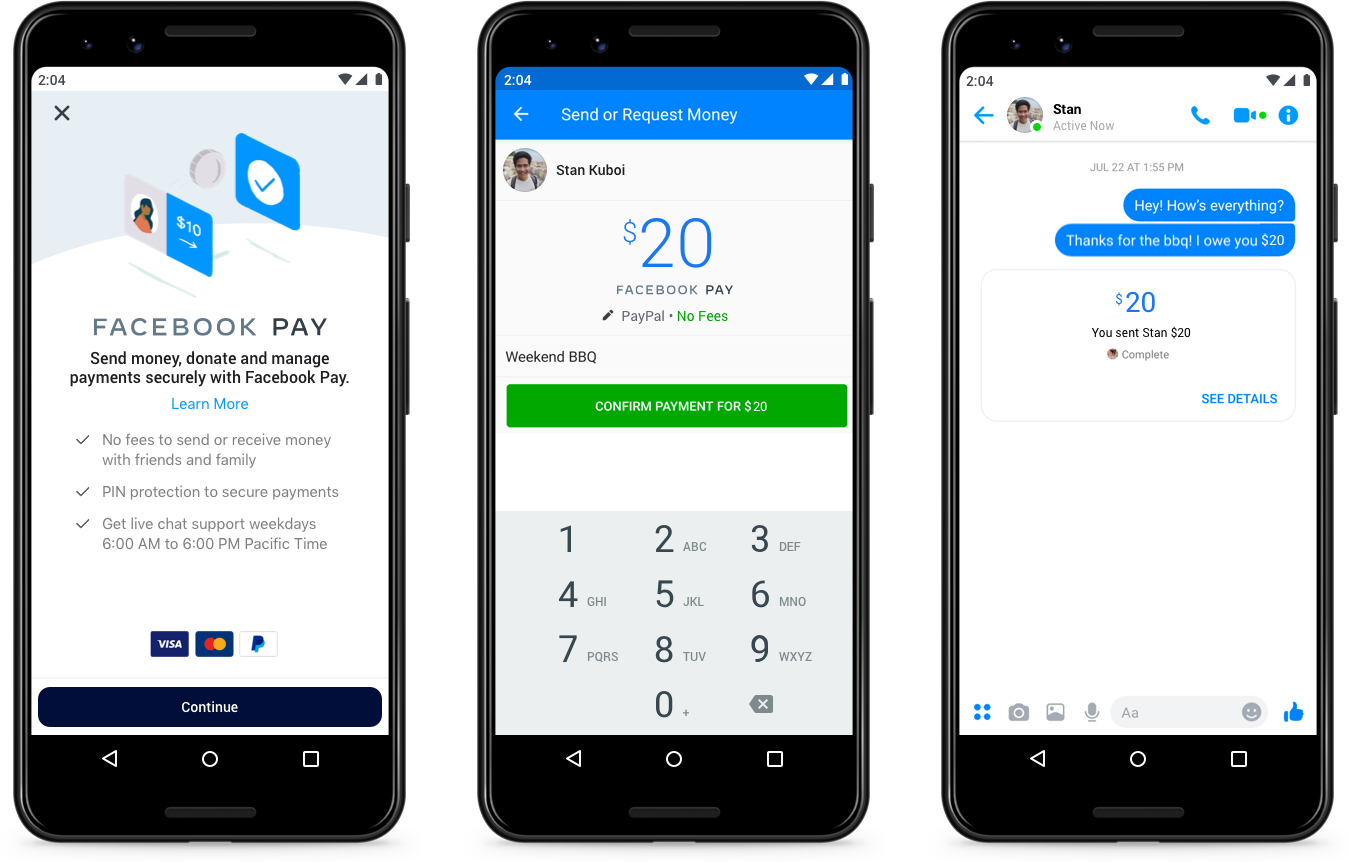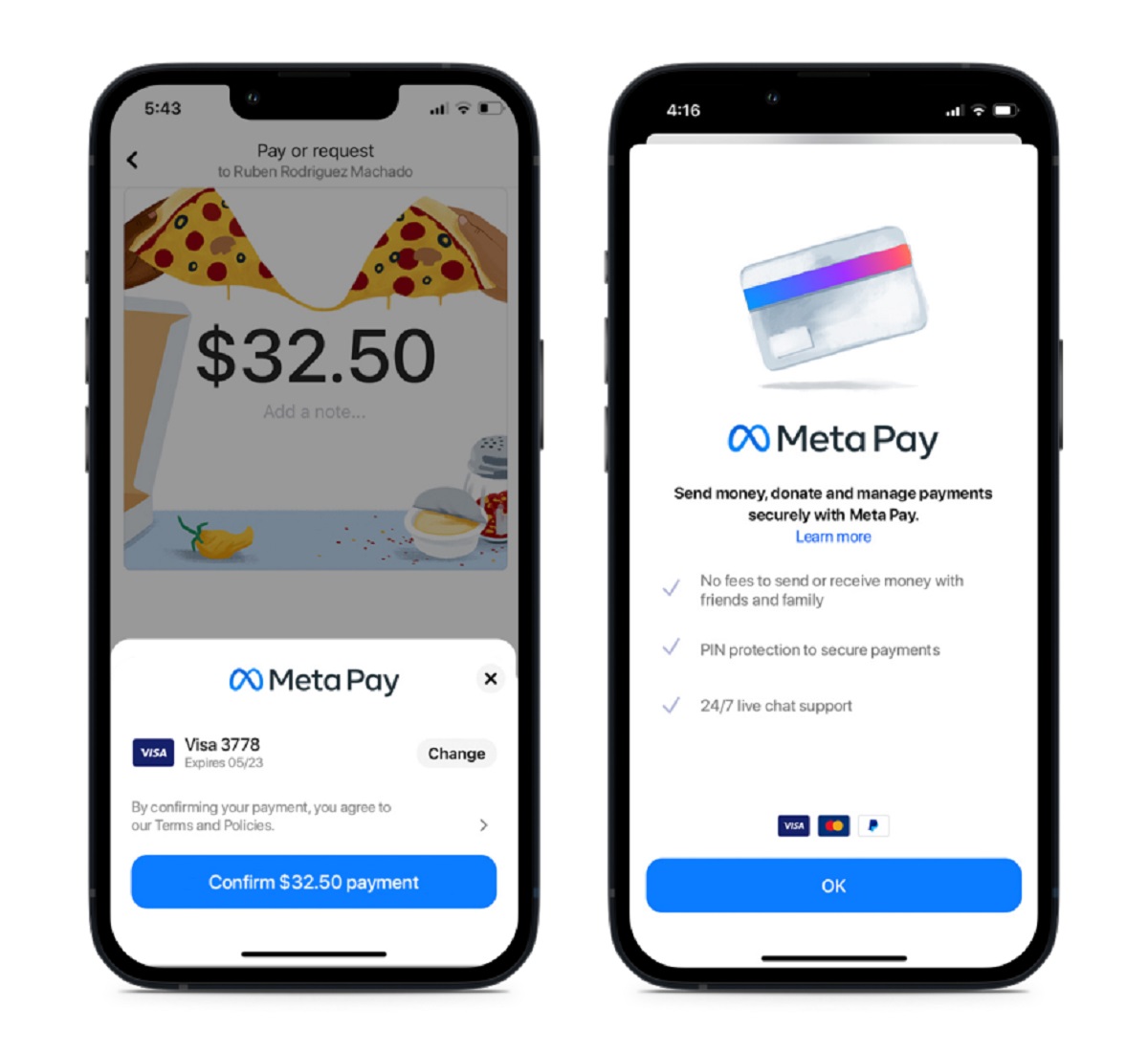Introduction
With the rise of online transactions and the increasing popularity of digital payment solutions, Facebook introduced its own payment platform known as Facebook Pay. This payment service allows users to securely send and receive money, make purchases, and donate to fundraisers directly within the Facebook platform.
Facebook Pay offers a convenient and seamless way to handle transactions, eliminating the need to navigate through external websites or apps. Whether you want to split the bill with friends, purchase products from Facebook Shops, or contribute to a charitable cause, Facebook Pay aims to provide a safe and efficient payment experience.
However, one common question that arises when using Facebook Pay is how long it takes for payments to process. The processing time can vary depending on several factors, and understanding them can help you plan your transactions accordingly.
In this article, we will explore the factors that affect the processing time of Facebook Pay transactions and provide important insights to help you understand the payment process better.
What is Facebook Pay?
Facebook Pay is a digital payment service offered by Facebook that allows users to send and receive money, make purchases, and donate to causes directly within the Facebook platform. It provides a seamless and convenient way to handle transactions without the need to rely on external payment platforms or navigate away from the Facebook app.
With Facebook Pay, users can securely link their preferred payment methods, such as credit or debit cards and even PayPal, to their Facebook accounts. This enables them to easily make payments or transfers to friends, family, or businesses right from their Facebook Messenger or through other Facebook services like Marketplace or Facebook Shops.
One of the key advantages of Facebook Pay is its cross-platform functionality. It can be used not only on the main Facebook platform but also on other Facebook-owned services, such as Instagram and WhatsApp. This allows for a consistent payment experience across different platforms, making it convenient for users who frequently switch between these apps.
Facebook Pay provides a secure payment infrastructure, prioritizing user privacy and data protection. It utilizes various security measures, including encryption and the ability to add an additional layer of authentication, such as a personal identification number (PIN) or biometric authentication, to ensure the safety of transactions.
Moreover, Facebook Pay offers its users detailed transaction history and the ability to manage their payment methods and settings all in one place. This centralized approach simplifies tracking and monitoring of transactions, making it easier for users to have a clear overview of their payments on Facebook.
Overall, Facebook Pay streamlines the payment process within the Facebook ecosystem, offering a convenient and secure solution for digital transactions. Whether it’s splitting a dinner bill, purchasing products online, or supporting a cause, Facebook Pay aims to provide a seamless and user-friendly payment experience without the need to rely on external payment platforms.
How long does it take for Facebook Pay to process payments?
The processing time for Facebook Pay payments can vary depending on several factors. Generally, Facebook Pay aims to process payments as quickly as possible to ensure a seamless transaction experience for its users.
In many cases, Facebook Pay transactions are processed instantly, allowing users to see the funds reflected in their accounts immediately. This is particularly true for payments sent between friends or family members within the same country. The near-instantaneous processing ensures that users can make spontaneous transactions without delays.
However, it’s important to note that there are instances when payment processing may take longer. For example, when making a payment to a business or merchant, the processing time can vary depending on the policies and internal processes of the receiving party. Some businesses may require additional time to verify and confirm the payment before processing it.
International transactions may also take longer to process due to factors such as currency conversion and different banking systems involved. Facebook Pay collaborates with various financial institutions to facilitate international payments, but these external factors can contribute to longer processing times.
Additionally, the payment method used can impact the processing time. Payments made with a credit or debit card are usually processed more quickly compared to bank transfers, which may require additional time for the funds to be cleared.
While the majority of Facebook Pay transactions are processed promptly, it’s important to understand that there may be occasional delays beyond Facebook’s control. These delays can be caused by external factors like technical issues, system maintenance, or disruptions in the banking network.
Overall, Facebook Pay strives to provide users with a fast and efficient payment experience. However, it is always advisable to allow for some flexibility in the processing time, especially when dealing with businesses, international transactions, or during periods of high transaction volumes.
Factors that can affect payment processing time
Several factors can influence the processing time of payments made through Facebook Pay. It’s important to be aware of these factors to understand why certain transactions may take longer to process. Here are the key factors that can affect payment processing time:
- Payment Method: The payment method used can have an impact on processing time. Payments made with credit or debit cards are typically processed more swiftly compared to bank transfers, which may require additional time for the funds to be cleared.
- Business Policies: When making payments to businesses or merchants, the processing time can be affected by their internal policies and processes. Some businesses may have manual verification or approval procedures in place that can cause delays in processing payments.
- Currency Conversion: For international transactions, currency conversion can introduce additional processing time. This process involves converting the amount from one currency to another, which may be subject to fluctuations in exchange rates and might require involvement from external financial institutions.
- Technical Issues: Like any online service, technical issues can occasionally occur with Facebook Pay. These issues might cause delays in payment processing. In such cases, it’s best to reach out to Facebook support for assistance.
- Banking Network: The banking network involved in the transaction can play a role in processing time. Different banks have varying procedures and timelines for fund transfers, which can contribute to longer processing times, especially for international transactions.
- Payment Volume: During periods of high transaction volumes, such as holidays or special events, the sheer amount of payment requests can lead to processing delays. The increased demand on the system may require additional time to process payments.
While Facebook Pay strives for prompt payment processing, it’s essential to keep these factors in mind and consider them when planning transactions. To ensure a smooth experience, it’s advisable to allow for a reasonable amount of time between initiating a payment and expecting the funds to be processed successfully.
By understanding these factors and being patient, users can navigate payment processing times more effectively and take advantage of the convenient and secure payment services provided by Facebook Pay.
Instant payments with Facebook Pay
One of the key advantages of using Facebook Pay is the ability to make instant payments. In many cases, transactions through Facebook Pay are processed immediately, allowing users to see the funds reflected in their accounts without delay.
Instant payments are particularly convenient when sending money to friends or family members within the same country. Whether it’s reimbursing a friend for dinner or splitting a bill, Facebook Pay ensures that the funds are transferred swiftly, making it easy to settle financial obligations on the spot.
Facebook Pay achieves this quick processing time by leveraging its partnerships with payment processors and financial institutions. These collaborations enable near-instantaneous fund transfers, ensuring that users can make spontaneous transactions without any meaningful wait times.
Furthermore, the seamless integration of Facebook Pay into various Facebook-owned platforms, such as Messenger, Instagram, and WhatsApp, allows for swift and effortless peer-to-peer payments. Whether you’re using the Messenger app to chat with friends, posting on Instagram, or engaging in a conversation on WhatsApp, Facebook Pay is readily available to facilitate instant payments.
Another benefit of instant payments with Facebook Pay is the added convenience when shopping on Facebook Shops. With Facebook Pay, users can make purchases directly within the platform without the need to navigate to external websites or payment processors. The instant processing ensures a smooth and efficient shopping experience.
It’s important to note that not all transactions can be processed instantly. Factors such as the payment method used, business policies, and international transfers can introduce additional processing time. However, Facebook Pay strives to make instant payments the norm, providing users with a quick and hassle-free way to handle their financial transactions.
Overall, instant payments with Facebook Pay provide users with the flexibility and convenience to send and receive funds instantly, simplifying the process of splitting bills, making purchases, and supporting businesses or causes. It’s a reliable solution for those seeking efficient and instantaneous financial transactions within the Facebook ecosystem.
Delays in payment processing
While Facebook Pay aims to provide quick and efficient payment processing, there are instances when delays can occur. It’s important to be aware of these potential delays and understand the factors that can contribute to them.
One common reason for delays in payment processing is the need for additional verification or approval. When making payments to businesses or merchants, they may have internal policies and procedures that require manual verification before processing the transaction. This added step can introduce a delay in the payment processing timeline.
International transactions can also experience delays due to currency conversion and involvement with different banking systems. The process of converting currency can take time, especially when there are fluctuations in exchange rates. Additionally, different banks may have varying procedures and processing times for international transfers, which can contribute to longer processing times.
Technical issues can also lead to delays in payment processing. While Facebook Pay strives to offer a seamless and reliable service, occasional technical glitches can occur. These issues can range from system maintenance or upgrades to disruptions in the banking network or payment processors. In such cases, it’s recommended to reach out to Facebook support for assistance.
Furthermore, during periods of high transaction volumes, such as holidays or special events, the sheer number of payment requests can lead to delays. The increased demand on the system may require additional time to process payments, resulting in longer processing times than usual. It’s important to plan ahead and allow for extra time during these peak periods to avoid any inconveniences.
It’s worth mentioning that occasional delays in payment processing are typically beyond Facebook’s control, as they may involve external factors such as the policies, procedures, or technical difficulties of other businesses or financial institutions. However, Facebook Pay continuously works to optimize its systems and partnerships to minimize processing delays and provide a seamless payment experience.
If you encounter significant delays in payment processing that exceed what can be considered normal, it’s advisable to contact Facebook support for assistance. They can investigate the issue further and provide guidance on how to resolve any potential payment-related concerns.
By understanding the potential causes of delays in payment processing, users can have realistic expectations and make informed decisions when using Facebook Pay for their transactions.
Contacting Facebook for payment issues
If you encounter any payment-related issues or have concerns while using Facebook Pay, it’s advisable to reach out to Facebook for assistance. Facebook has a dedicated support system to help users resolve payment issues promptly and efficiently.
If you notice a delay in payment processing or if a payment doesn’t go through as expected, the first step is to check your transaction history within the Facebook Pay settings. Look for any error messages or notifications that may provide insights into the issue. It’s also a good idea to confirm that your payment method is up to date and that you have sufficient funds or credit available.
If the issue persists or you need further assistance, you can contact Facebook support through various channels. One option is to visit the Facebook Help Center, where you can find a comprehensive knowledge base and a search feature to look for specific payment-related topics or frequently asked questions.
In addition, Facebook provides a support form where you can submit a detailed inquiry or complaint about a payment issue you’re experiencing. The support form allows you to describe the problem, attach relevant screenshots or documents, and provide additional context to help the support team understand your situation better. This allows them to provide more targeted assistance and investigate the matter promptly.
Facebook also offers support through its social media channels, such as the official Facebook or Messenger Twitter accounts. You can send a direct message to these accounts, explaining your payment issue and requesting assistance. The social media support team will do their best to respond and guide you through the necessary steps to resolve the problem.
When contacting Facebook for payment issues, it’s important to provide accurate and detailed information about the problem you’re facing. Be sure to include relevant transaction details, error messages, screenshots, or any other supporting documentation that can help Facebook’s support team understand and address the issue effectively.
Keep in mind that response times may vary depending on the complexity of the issue and the volume of support requests received. However, Facebook strives to provide timely and helpful assistance to users facing payment-related challenges.
By reaching out to Facebook for payment issues and providing the necessary information, you can increase the chances of resolving the problem efficiently and enjoying a smooth payment experience with Facebook Pay.
Conclusion
Facebook Pay offers a convenient and secure way to handle transactions within the Facebook ecosystem, allowing users to send and receive money, make purchases, and support causes seamlessly. While the processing time of Facebook Pay payments can vary depending on factors such as payment method, business policies, and international transfers, Facebook Pay aims to process transactions as quickly as possible.
Instant payments are a major benefit of using Facebook Pay, enabling users to see funds reflected in their accounts immediately for transactions between friends and family members. Additionally, Facebook Pay provides a unified payment experience across Facebook-owned platforms, ensuring consistency and convenience.
However, delays in payment processing may occur due to factors such as additional verification requirements, currency conversion, technical issues, banking networks, or high transaction volumes. Understanding these factors can help users set realistic expectations and plan accordingly.
If you encounter payment-related issues, contacting Facebook for assistance is recommended. The support team can be reached through the Facebook Help Center, the support form, or social media channels. Providing accurate and detailed information about the issue will help Facebook’s support team resolve the problem efficiently.
Facebook Pay continues to enhance its services and partnerships to minimize delays in payment processing and provide a seamless payment experience for users. By using Facebook Pay responsibly and staying informed about its features and potential challenges, users can enjoy the convenience and security of digital transactions within the Facebook platform.

























